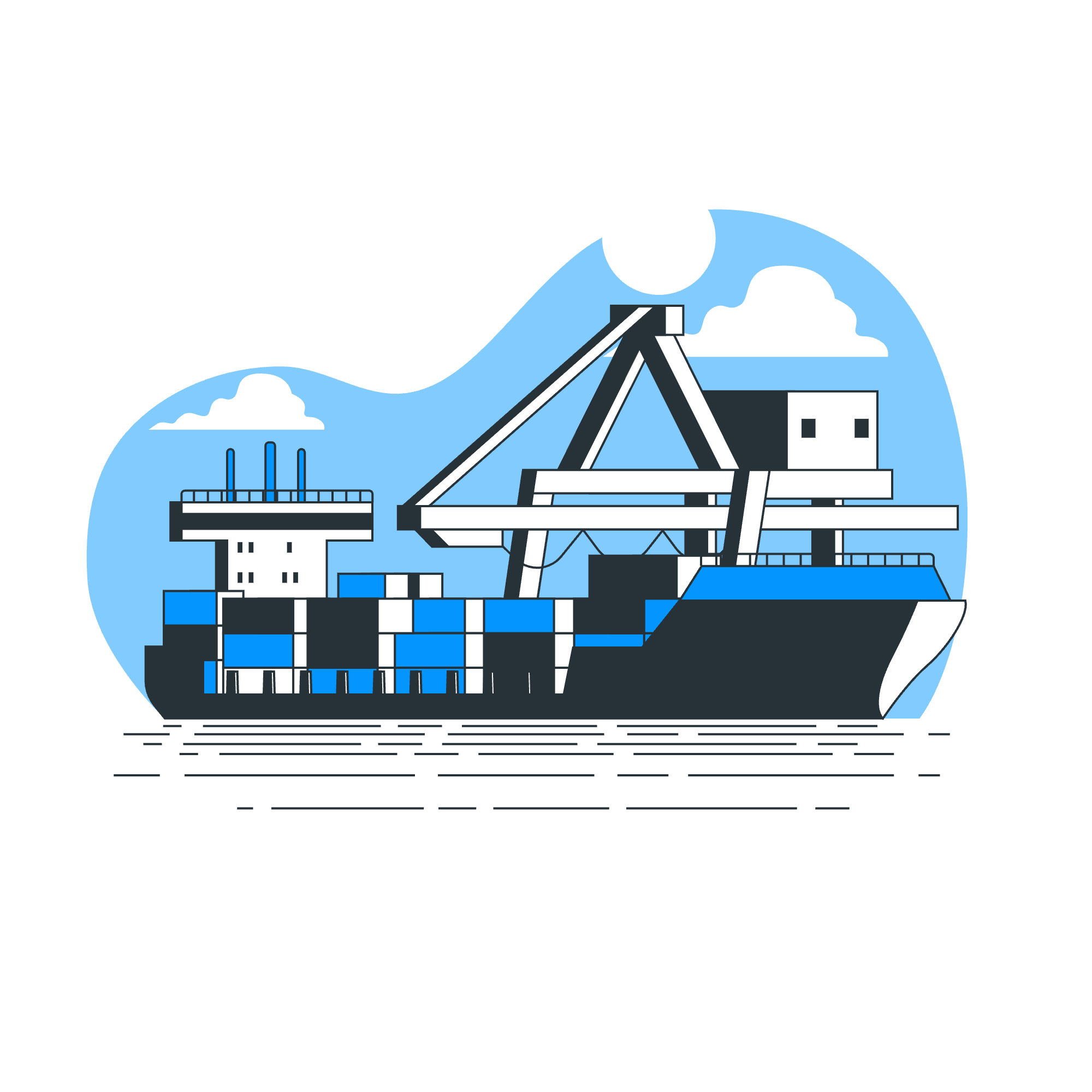
Transport Management System (TMS)
A Transport Management System (TMS) is essential for optimizing the movement of goods across all modes of transport. Our TMS solution automates transportation planning, execution, and optimization, enabling businesses to reduce costs and improve operational efficiency.
Key Features:
- Route Optimization: Automates the selection of the most efficient routes, minimizing transportation costs.
- Carrier Management: Select and manage carriers for different modes of transportation (road, rail, sea, air).
- Real-Time Tracking: Provides end-to-end visibility of shipments, helping to track and manage delays and disruptions.
- Freight Cost Management: Automates the calculation of freight costs, helping to optimize spending and increase profitability.
- Customer Experience: Improves customer satisfaction by providing accurate delivery times and visibility.
Benefits:
- Reduces manual work and human error.
- Increases efficiency by optimizing routes and consolidating shipments.
- Improves visibility and collaboration across all stakeholders.
Cargo Visibility Solutions
Cargo Visibility systems track goods throughout the supply chain, providing real-time updates on the status, location, and condition of cargo. This solution is crucial for ensuring smooth operations and preventing delays or theft.
Key Features:
- Real-Time Tracking: Track cargo from the point of origin to the final destination.
- Condition Monitoring: Monitor the condition of sensitive cargo, such as perishables, pharmaceuticals, or high-value goods.
- Notifications & Alerts: Automatically notify stakeholders of delays, temperature variations, or other issues that could impact delivery.
Integration with IoT: Leverages Internet of Things (IoT) devices for real-time data collection on cargo location and condition.
Benefits:
- Enhances visibility for shippers, freight forwarders, and customers.
- Prevents theft, loss, or damage by tracking cargo in real time.
- Helps ensure compliance with regulatory standards, such as temperature-controlled goods.

Digital Intermediaries
Digital Intermediaries streamline the connection between buyers, sellers, and service providers within the supply chain. These platforms serve as an online marketplace for various stakeholders to engage in transactions, from booking transport services to managing contracts.
Key Features:
- B2B Platforms: Facilitates business-to-business interactions between logistics service providers (e.g., freight forwarders, customs brokers).
- Smart Contracts: Digital contracts that automate the execution of agreements, reducing paperwork and administrative tasks.
- Marketplace for Services: Allows logistics companies to find and book the best services for their needs.
- End-to-End Visibility: Provides comprehensive tracking and documentation for all interactions.
Benefits:
- Reduces the need for intermediaries and manual interventions.
- Enhances transparency and trust between service providers and customers.
- Improves efficiency by automating service booking and payment processes.
Warehousing Software
Warehousing Software optimizes storage, inventory management, and order fulfillment processes in warehouses and distribution centers.
Key Features:
- Inventory Tracking: Monitors stock levels in real-time and automates replenishment processes.
- Space Optimization: Maximizes warehouse space usage by optimizing storage strategies and layout.
- Order Fulfillment: Automates picking, packing, and shipping processes to accelerate order fulfillment.
- Integration with TMS & ERP: Syncs warehouse data with other logistics systems to create a cohesive supply chain ecosystem.
Benefits:
- Reduces stock-outs and overstocking by providing real-time inventory management.
- Increases operational efficiency by automating key processes like picking, packing, and shipping.
- Enhances accuracy and reduces human error in order fulfillment.


Digital Documentation & Bill of Lading (BoL)
Digital solutions for documentation and Bill of Lading (BoL) allow for paperless processing of critical documents in logistics. This helps reduce fraud, increase transparency, and simplify cross-border trade.
Key Features:
- Digital Bill of Lading: The digitization of BoL enables it to be transferred instantly and securely between parties, reducing paperwork and processing time.
- Secure Document Storage: Secure storage of documents such as invoices, contracts, and customs declarations.
- Blockchain Integration: Blockchain technology ensures the authenticity and traceability of documents, reducing the risk of fraud.
Benefits:
- Speeds up document processing and reduces administrative overhead.
- Eliminates the risk of document loss or forgery.
- Enhances transparency and trust by ensuring accurate documentation.
Freight Brokerage Software
Freight Brokerage Software helps freight brokers connect shippers with carriers, managing the booking, tracking, and payment processes.
Key Features:
- Carrier Management: Find and manage a list of trusted carriers and negotiate rates.
- Load Matching: Match available loads with carriers based on proximity, capacity, and requirements.
- Automated Documentation: Automatically generate and manage invoices, contracts, and other paperwork.
- Real-Time Tracking: Keep customers updated with live tracking information.
Benefits:
- Reduces manual intervention and automates load matching, booking, and payment.
- Improves efficiency and reduces freight costs by optimizing the matching process.
- Increases transparency and trust by providing all parties with accurate, real-time information.


Trucking Software for Carriers
Trucking Software for Carriers is designed to streamline and optimize the operations of trucking companies, improving their fleet management, route planning, and customer service.
Key Features:
- Route Optimization: Identifies the fastest, most cost-efficient routes based on traffic, weather, and road conditions.
- Fleet Management: Tracks trucks, drivers, and maintenance schedules to ensure the fleet runs smoothly.
- Driver Scheduling: Automates driver assignments, schedules, and route planning.
- Automated Invoicing & Payments: Streamlines billing and payment processes for carriers and shippers.
Benefits:
- Increases fleet efficiency by optimizing routes and scheduling.
- Reduces operational costs by improving fuel efficiency and asset utilization.
- Enhances customer satisfaction with accurate, on-time deliveries.
Automation in Logistics
Automation in logistics covers everything from warehouse operations to transportation planning. By automating repetitive tasks, businesses can save time, reduce costs, and improve accuracy.
Key Features:
- Robotic Process Automation (RPA): Automates manual processes such as order entry, invoicing, and shipment tracking.
- Automated Warehousing: Use of robots and automated systems for picking, packing, and sorting goods.
- Autonomous Vehicles: Integration of autonomous trucks and drones for last-mile delivery and transportation.
Benefits:
- Reduces labor costs and human error.
- Increases the speed and efficiency of logistics operations.
- Enhances scalability by allowing businesses to handle larger volumes with fewer resources.


Global Trade Management (GTM)
Global Trade Management (GTM) solutions streamline international logistics and compliance, helping businesses manage cross-border trade more efficiently.
Key Features:
- Customs Compliance: Automates the submission of import/export declarations and ensures compliance with international regulations.
- Tariff & Duty Management: Helps manage and optimize customs duties, tariffs, and taxes.
- Cross-Border Visibility: Provides visibility into the entire international supply chain, from production to delivery.
Benefits:
- Minimizes customs delays and ensures smooth international trade.
- Reduces the risk of non-compliance and costly penalties.
- Streamlines global shipping and reduces the complexity of cross-border logistics.
Freight Forwarding Software
Freight Forwarding Software helps freight forwarders manage the complex logistics involved in moving goods from origin to destination.
Key Features:
- Cargo Tracking: Provides end-to-end visibility of shipments across different transportation modes.
- Document Management: Automates the handling of bills of lading, invoices, and other essential documents.
- Customs Brokerage Integration: Facilitates the customs clearance process to ensure timely delivery.
Benefits:
- Improves efficiency by automating routine tasks and processes.
- Enhances customer service with real-time tracking and proactive communication.
- Streamlines customs and documentation processes to reduce delays and avoid penalties.


Port/Terminal Interface Software
Port/Terminal Interface Software connects logistics systems with port and terminal operators, enabling better management of containers and cargo during their time
Key Features:
- Real-Time Port Data: Provides updates on container status, berth availability, and crane scheduling.
- Integrated Booking Systems: Connects shipping lines with ports and terminals to streamline booking processes.
- Cargo Handling Management: Improves the scheduling and tracking of cargo handling tasks.
Benefits:
- Enhances efficiency in cargo handling and port operations.
- Reduces congestion and delays in port terminals.
- Provides visibility for all stakeholders involved in port activities.
Freight Audit and Payment
Freight Audit and Payment software automates the auditing and payment processes for freight invoices, helping companies avoid overcharges and streamline financial operations.
Key Features:
- Invoice Verification: Automatically verifies freight invoices against contracts and shipping details.
- Automated Payment: Facilitates seamless payment to carriers and service providers.
- Reporting & Analytics: Provides insights into spending patterns, helping identify opportunities for cost savings.
Benefits:
- Ensures accurate payments and prevents overcharging.
- Increases financial visibility and accountability across the supply chain.
- Reduces administrative costs and improves cash flow management.
